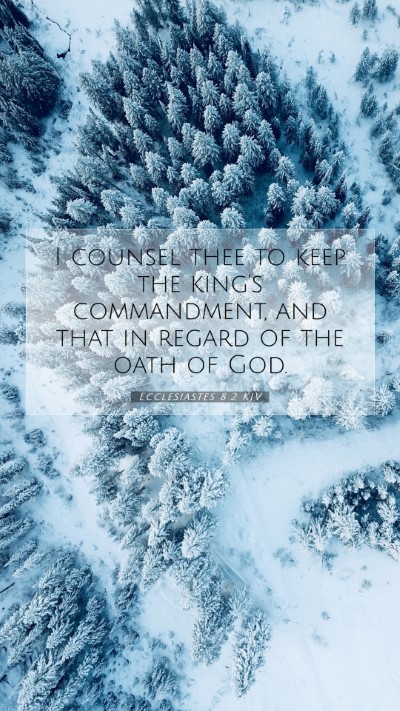Ecclesiastes 8:2 - Meaning and Commentary
Ecclesiastes 8:2 states: "I say: Keep the king's command, because of God's oath to him." This verse offers profound insights into the relationship between divine authority and earthly governance. Below, we explore its meaning through the lenses of public domain commentaries.
Overview of Ecclesiastes 8:2
In this verse, the author, traditionally believed to be King Solomon, emphasizes the importance of obedience to authority, particularly the king. The command reflects not just a political duty but also a spiritual obligation, rooted in the recognition of God’s sovereignty.
Bible Verse Interpretations
-
Matthew Henry's Commentary:
Matthew Henry highlights that to keep the king's command is a sign of wisdom. He explains that one must recognize the established authorities as ordained by God. The 'oath' refers to the covenant of loyalty that subjects owe to their rulers, underscoring the social contract that promotes order and stability.
-
Albert Barnes' Notes:
Albert Barnes interprets this command as part of the moral and ethical obligations of individuals in society. He suggests that obedience to authority aligns with the broader principles of living righteously. Barnes posits that when one follows the king’s directives, they are essentially honoring God’s plan for governance and society.
-
Adam Clarke's Commentary:
Adam Clarke draws attention to the context of the verse, suggesting that it may reflect historical circumstances in which rulers held significant power and influence. His commentary emphasizes that both fear of God and acknowledgment of human authority are essential for maintaining order and justice.
Bible Study Insights
Understanding Ecclesiastes 8:2 opens avenues for deeper reflection on authority and obedience in contemporary contexts. It raises questions about the responsibilities of citizens toward their leaders and the divine expectations surrounding these relationships.
In-Depth Bible Verse Analysis
The command to obey "the king's command" can be viewed through various lenses:
-
Historical Context:
Considering the monarchical system prevalent during Solomon’s reign, the text imparts significant meaning regarding loyalty and civil duty. The historical backdrop enhances the understanding of submission to authority as both a political and spiritual necessity.
-
Modern Application:
In a contemporary setting, this verse informs discussions on civic engagement and respectful opposition within democratic frameworks. It raises pertinent points regarding how believers should conduct themselves in relation to governance, especially in challenging times.
Significance of Ecclesiastes 8:2
The significance of this verse lies in its dual emphasis on respect for authority paired with the acknowledgment of God’s sovereignty. It serves as a reminder of the balance between divine and human obligations, and encourages reflective dialogue on the implications of the king’s command in both historical and modern contexts.
Cross References
- Romans 13:1-2: "Let every person be subject to the governing authorities..."
- Proverbs 21:1: "The king's heart is a stream of water in the hand of the Lord..."
- 1 Peter 2:13-14: "Be subject for the Lord's sake to every human institution..."
Conclusion
Ecclesiastes 8:2 invites readers to reflect on their duties to both God and governance. By recognizing the historical and spiritual significance of authority, individuals can cultivate a more profound understanding of their roles in society. This text is an invaluable resource for Bible study groups, providing foundational insights for biblical exegesis and practical implications for Bible study lessons.


